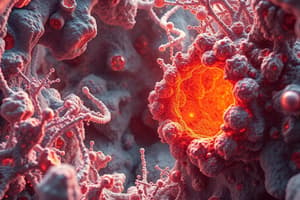Podcast
Questions and Answers
What does the branch of electronics study?
What does the branch of electronics study?
- The design of mechanical devices
- The flow of electricity in wires
- The principles of thermodynamics
- The behavior of electrons in various environments (correct)
Who invented the vacuum diode?
Who invented the vacuum diode?
- Samuel Morse
- Thomas Edison
- J.A. Fleming (correct)
- Lee De Forest
What was significant about Lee De Forest's contribution to electronics?
What was significant about Lee De Forest's contribution to electronics?
- He created the first telegraph.
- He developed the first semiconductors.
- He discovered the electron.
- He invented the first electrical amplifier. (correct)
Which of the following statements is accurate regarding Heinrich F.E. Lenz?
Which of the following statements is accurate regarding Heinrich F.E. Lenz?
What did Thomas Edison contribute to the field of electronics?
What did Thomas Edison contribute to the field of electronics?
Who formulated the electromagnetic field equations?
Who formulated the electromagnetic field equations?
What is the significance of Crookes tubes in the history of electronics?
What is the significance of Crookes tubes in the history of electronics?
What unit of measurement was named after Andre-Marie Ampere?
What unit of measurement was named after Andre-Marie Ampere?
Which individual is credited with the invention of the IC (integrated circuit)?
Which individual is credited with the invention of the IC (integrated circuit)?
What technology did Ray Prasad introduce into airplanes and security systems?
What technology did Ray Prasad introduce into airplanes and security systems?
Who invented the FM radio and in what year was it patented?
Who invented the FM radio and in what year was it patented?
Which law allows the calculation of voltages, currents, and resistances in electrical networks?
Which law allows the calculation of voltages, currents, and resistances in electrical networks?
What was the main contribution of Walter Schottky in the field of electronics?
What was the main contribution of Walter Schottky in the field of electronics?
Who is known for employing the quantum hypothesis to explain electromagnetic radiation?
Who is known for employing the quantum hypothesis to explain electromagnetic radiation?
What did Jack St.Clair Kilby accomplish in the development of integrated circuits?
What did Jack St.Clair Kilby accomplish in the development of integrated circuits?
What technology is involved in the assembly of electronic components on PCBs, as described in the content?
What technology is involved in the assembly of electronic components on PCBs, as described in the content?
Flashcards are hidden until you start studying
Study Notes
Overview of Electronics
- Electronics studies the flow and control of electrons and their behavior in vacuum, gases, and semiconductors.
- Devices in electronics resist, carry, select, steer, switch, store, manipulate, and exploit electrons.
Historical Milestones in Electronics
- J.A. Fleming invented the vacuum diode in 1897, marking the start of electronics.
- Lee De Forest developed the vacuum triode to amplify electrical signals, leading to the tetrode and pentode tubes used until World War II.
Key Figures in Early Electronics
- Samuel Morse (1791-1872): Innovated telegraphy with electromagnets and created Morse code in 1844.
- Joseph Henry (1799-1878): Independently discovered electromagnetic induction in 1831.
- Heinrich Lenz (1804-1865): Formulated Lenz's law regarding induced currents and their resistance to mechanical action.
- James Clerk Maxwell (1831-1879): Developed key electromagnetic field equations in 1864 and proposed the electromagnetic theory of light.
- Sir William Crookes (1832-1919): Created Crookes tubes in 1878 for electrical discharges.
- Heinrich Hertz (1857-1894): First to demonstrate the existence of radio waves.
Contributions to Electrical Theories
- Andre-Marie Ampère (1775-1836): Formulated effects of electric current and the SI unit of electric current, the Ampere.
- Wilhelm Eduard Weber (1804-1891): Explored terrestrial magnetism and devised the electromagnetic telegraph in 1833.
Innovations in Devices and Technologies
- Thomas Edison (1847-1932): Developed practical electric bulbs, motion picture cameras, and other devices.
- Nikola Tesla (1856-1943): Invented the Tesla coil, crucial for electronic equipment and radio technology.
- Gustav Kirchhoff (1824-1887): Established Kirchhoff's law for analyzing voltages and currents in electrical networks.
Foundations of Modern Electronics
- James Prescott Joule (1818-1889): Discerned the law of conservation of energy.
- Albert Einstein (1879-1955): Used Planck's quantum hypothesis to explain electromagnetic radiation and introduced concepts related to thermionic tubes.
- Walter Schottky (1886-1976): Defined shot noise, significant in electronic component performance.
- Edwin Howard Armstrong (1890-1954): Invented the electronic oscillator, regenerative feedback circuit, and patented FM radio in 1933.
Revolutionizing Electronics
- Jack St. Clair Kilby (1923-2005): Invented the integrated circuit (IC) at Texas Instruments.
- Robert Noyce (1927-1990): Advanced the development of ICs through practical scaling techniques.
- Seymour Cray (1925-1996): Recognized as the "father of supercomputers."
Technological Advancements in Assembly
- Ray Prasad (1946-2019): Pioneered Surface Mount Technology (SMT) for mounting electronic components, enhancing efficiency in assembly.
Studying That Suits You
Use AI to generate personalized quizzes and flashcards to suit your learning preferences.




